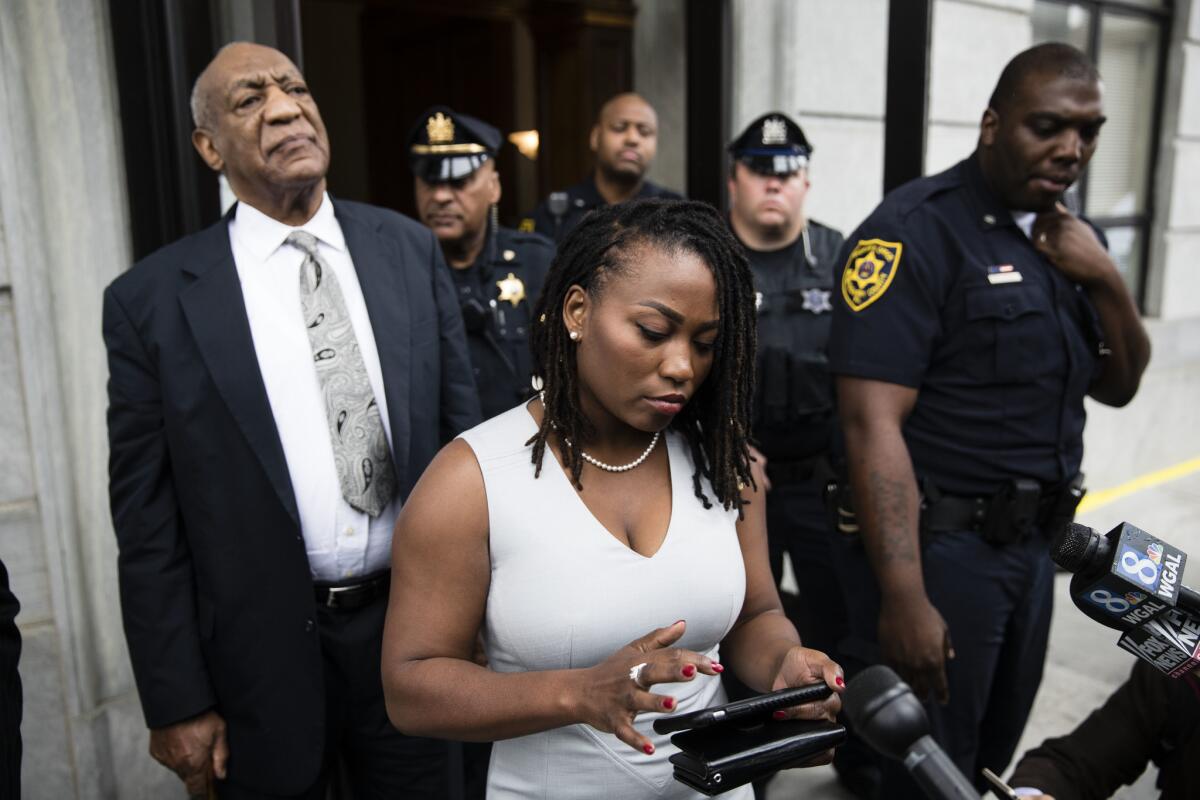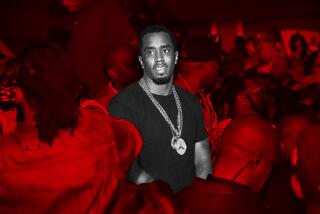One night, two stories: In the Bill Cosby saga of sex, race, celebrity and alleged assault, even the jury couldn’t agree on the truth

- Share via
Reporting from Norristown, Pa. — The dozen jurors in the Bill Cosby sexual assault trial spanned a diverse demographic range: white men in their 20s and 30s, middle-aged African Americans, elderly white women.
But with that diversity also came deadlock. After five long days of deliberations, the jury found itself unable to render a verdict — like so much of this country, unable to find consensus on charged questions of race, age, power and gender.
Cosby will now face a new trial as soon as October, the judge said in declaring a mistrial Saturday morning. The prosecutor said that he hopes to settle the matter by pressing ahead with the same three counts of aggravated indecent assault. The accuser, Andrea Constand, will take the stand again to testify that Cosby drugged and molested her.
But the jurors’ inability to reach a verdict, after more than 100 hours of testimony and deliberations in this suburban Philadelphia courtroom, brought home how divided opinions are about Cosby — and about a lot more. (The jurors did not speak with reporters.)
To many, the former sitcom dad and stand-up icon is an avatar of privilege and misogyny that must be torn down in an enlightened 21st century. The facts of the case — Cosby invited Constand to his home, provided her pills he didn’t identify and then penetrated her with his fingers — speak for themselves, they say. This was sex without consent. And they want a public reckoning.
“The jury worked hard, and I have respect for everyone’s opinion,” Linda Kirkpatrick, a bakery owner from Costa Mesa who alleged Cosby assaulted her in 1981, told The Times outside the courtroom Saturday afternoon. “But my experience trumps your opinion.”
Attorney Gloria Allred, who represents many of the Cosby accusers, added that the entertainer’s fame carried its own power. “We can never overestimate the blinding power of celebrity,” she said after the mistrial was declared
To others, though, the facts do not necessarily add up to assault. And regardless, they believe, Cosby is a symbol: a victim of an overly litigious culture that unfairly targeted him in the name of political correctness.
“We know why we’re here. Let’s be real,” said Cosby lawyer Brian McMonagle, giving voice to that school in his closing argument. “We’re not here because of Andrea Constand.” He pointed dramatically to a group of outspoken sexual assault activists in the back of the room, including Kirkpatrick. “We’re here because of them.”
.Certainly the facts were complicated in their own right.
Constand described how, on a night at Cosby’s home in 2004, she began to lose her mental capacities after ingesting three pills that Cosby had offered her. He told her, she said, that they were herbal. “Little friends,” he called them.
“He assisted me over to the couch and just said, ‘Relax, just lay down here, you need to relax,’” she testified. “I was laying on my left side and he placed some kind of pillow [under me]. I have no real recollection except later I was jolted awake,” she said, going on to describe how he used his hand to violate her. (Many women have accused Cosby of similar conduct, but only Constand’s case has gone to trial.)
Over the last 13 days, jurors considered the entertainer’s defense that the encounter was consensual, while Constand, taking the stand and facing Cosby, testified that he had robbed her of the ability to consent. Had he been found guilty, the 79-year-old would have faced a maximum of 10 years in prison on each count.
Constand maintained contact with Cosby after the attack — a point emphasized by the defense — but the district attorney, Kevin Steele, brought in expert witnesses who said such behavior is common among people who have been sexually assaulted by someone they know. The state also tried to fortify its case with testimony from Constand’s mother and another Cosby accuser, former Hollywood agent assistant Kelly Johnson, who testified she was the victim of a similar assault by Cosby.
Cosby’s lawyers countered by pointing out inconsistencies in Constand’s story, and noted she had taken the pills willingly. They also put forth the idea that the two had been sharing a romance.
The arguments raised plenty of questions in the jury room. After returning to ask for large portions of the testimony to be re-read, on Friday the jurors came back with a simple query for the judge:
“What is reasonable doubt? (The definition.)”
That one or more jurors were unwilling to believe in Cosby’s guilt is a hard reality to accept for those who feel strongly about sexual assault; they say it’s a similar reluctance that has allowed a culture of concealment to fester around these crimes.
In a country where sexual attacks still go underreported, they argue, Bill Cosby epitomizes exactly what needs to be done away with — the idea that privilege can shield predators. That is true in everyday spaces, such as the workplace and college campuses.
And it is especially true in realms such as Hollywood and the military, with their clear chain-of-command cultures.
A conviction Saturday, they say, would have made a resounding statement about all of that. “It doesn’t matter what you look like or who you are,” Steele said to reporters after the mistrial about the message of his prosecution. “Nobody’s above the law.”
Kirkpatrick noted that “only 2% of accused rapists go to jail and 98% walk free, and that number needs to be reversed.”
Yet not everyone saw this case as cut-and-dried — either legally or culturally.
Outside the courthouse, throughout the trial, a small group of demonstrators had gathered, bearing signs with such messages as “Free Bill Cosby” and “100% innocent.” While the auspices of this group remained murky — members wouldn’t answer who had sent them or whether they were paid — they nonetheless spoke for a population that has alleged Cosby was more victim than perpetrator.
An aide to Cosby, Ebonee Benson, read his wife’s statement articulating this belief outside the courtroom Saturday, while Cosby stood silent alongside here. Camille Cosby decried an “overtly arrogant” judge, a “totally unethical” D.A. and a “blatantly vicious” media. This whole trial was an attempt at a take-down, she suggested, by people who had already made up their minds about — or even had an ax to grind with — her famous husband.
Andrew Wyatt, Cosby’s spokesman, suggested this mistrial was a triumph for black America as well.
“Johnnie Cochran is looking down smiling,” Wyatt told reporters after the mistrial, referencing Cosby’s late friend and star defense attorney for O.J. Simpson. It was one of several invocations of Cochran that Wyatt had made to reporters throughout the last two weeks, and it was not an accident. Cosby’s team, at least, saw this case through a we-defeated-the-rigged-system lens as many African Americans viewed Simpson’s 1995 verdict.
But notions of race were was also hard to avoid from the accusers’ side. Cosby was able to perpetrate his crimes, they said, in part because of his skin color.
“I had the utmost respect and admiration for him based on what millions of other Americans, especially African American folks, thought of him,” said Johnson, who is black, of why she initially began to trust the entertainer.
Cosby’s age also played a role in winning over his alleged victims, they said. Constand underscored how he was in his 60s while she was not yet 30 when they began getting to know each other.
“He was a Temple friend, somebody I trusted, a mentor, an older figure to me,” Constand testified, in describing how she came to trust him.
As the defense looked to sow doubt, it emphasized what it said was a romance, a May-December affair that Constand willingly signed onto, with the night in question a consensual part of that. But victims say that there isn’t sufficient social awareness about how such a power differential can be used to an attacker’s advantage, particularly when it comes to persuading them to abandon their judgment.
With its lack of resolution and finality, with its muddied message and do-over mentality, the Cosby mistrial has left us as confused about where the country stands on these issues. The embodiment of this might come in the form of Lili Bernard.
A guest actress on “The Cosby Show,” Bernard had accused Cosby of violating her decades ago. She had been outspoken over the last two weeks about what this trial meant for her and the larger culture of sexual assault reporting, often giving long and eloquent disquisitions on the courthouse steps upon the conclusion of proceedings.
But on Saturday afternoon she staggered out of the court looking dazed and pained. Her vital expression had melted, and she wandered around the courthouse plaza in stunned silence.
See the most-read stories in Entertainment this hour »
Twitter: @ZeitchikLAT
ALSO
Why L.A. women who accused Bill Cosby of assault have not seen their day in court
Bill Cosby’s relationship with African Americans is anything but black and white
Bill Cosby: A 50-year chronicle of accusations and accomplishments
More to Read
Sign up for Essential California
The most important California stories and recommendations in your inbox every morning.
You may occasionally receive promotional content from the Los Angeles Times.











